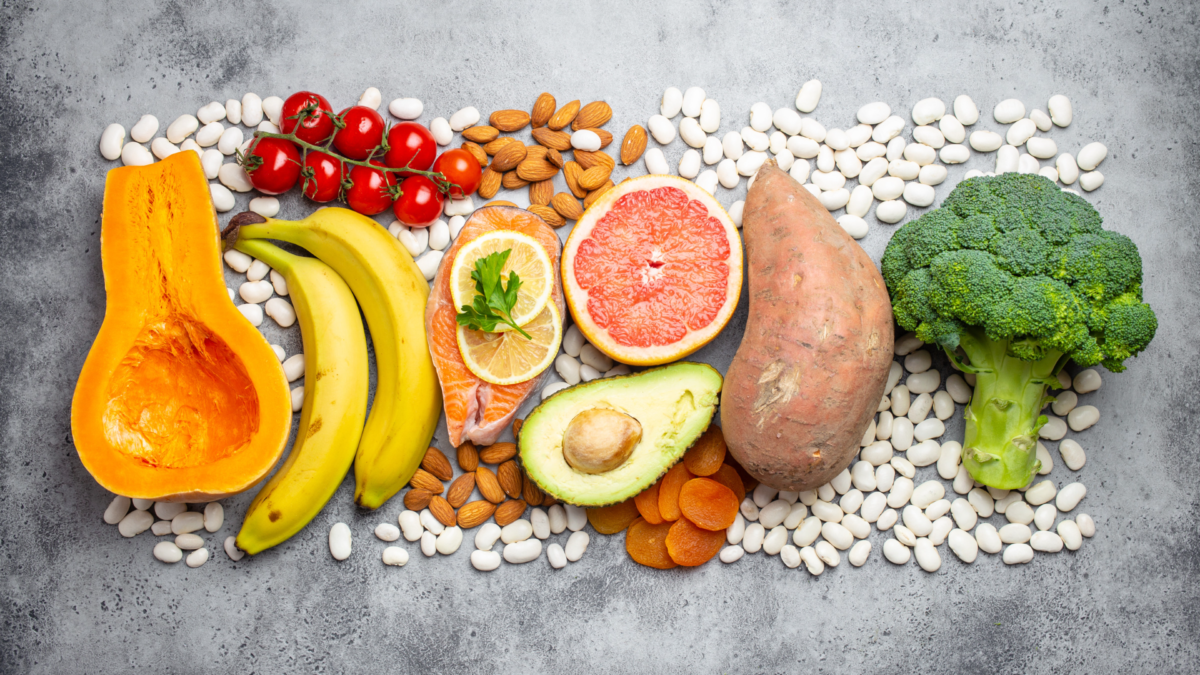
Potassium is one of the main minerals your body needs in large amounts. It exists as a positively charged ion in the fluids within all cells in the body. Potassium works with sodium and chloride to maintain fluid balance and transmit nerve signals, but it also plays a role in heart function and muscle contraction and promotes bone health.

How much potassium do you need?
The amount of potassium you need daily depends on your age, sex and life stage. In the United Kingdom, children up to age four need around 765mg daily, while adults need 3500mg. The recommended daily intake for adults in the United States is 4700mg.
What foods contain potassium?
Unrefined foods, including fruits, vegetables, whole grains, nuts, seeds, and meats, are rich sources of potassium.
Potassium Content of Selected Foods (*Common Nigerian foods)
| Food | Potassium Content (mg) |
| Fresh Vegetables *Amaranth (éfo) leaves, 100g raw *Baobab (miyan kuka) leaves, 100g raw Asparagus, ½ cup *Avocado, ½ Carrot, 1 raw Corn, ½ cup *Eggplant leaves (éfo Igbo, anara), 100g raw *Jute (èwedu) leaves, 100g raw Parsley, fresh *Plantain, 100g raw *Fluted pumpkin (úgu) leaves, 100g raw Potato, 1 medium Spinach, ½ cup cooked Tomato, 1 medium, raw | *602 *391 165 *680 225 136 *437 *437 600 *500 *468 782 292 444 |
| Fresh Fruit *African locust bean (iru), 100g *Akee, 100g Avocado, 100g Banana, 100g *Baobab (Miyan Kuka), 100g *Guava, 100g *Papaya (pawpaw), 100g *Orange Peach | *1670 *340 492 369 *1020 *270 *210 *263 308 |
| Unprocessed meats Beef, 100g raw Chicken liver, 100g raw *Goat meat, 100g raw | 360 241 *385 |
| Nuts and seeds *Groundnut, 100g raw *Melon seeds, 100g raw Sesame seeds, 100g raw | *711 *867 643 |
| Fish Catfish, 100g raw Mackerel, 100g raw Sardine, 100g raw Tilapia, 100g raw | 375 507 499 378 |
What happens if you don’t get enough potassium?
Potassium deficiency typically occurs when a person’s diet is low in fresh fruit and vegetables but high in sodium. It also arises from prolonged diarrhoea or vomiting, excessive use of laxatives, heavy sweating, dialysis or medications. Low potassium levels can increase blood pressure, deplete bone calcium, and increase kidney stones risk.
Signs of potassium deficiency include constipation, tiredness and muscle weakness. In more severe cases, it causes frequent urination, mental confusion, high blood sugar, difficulty breathing, problems with nerve signalling and irregular heartbeats.
What happens if you get too much potassium?

Most healthy people can excrete excess potassium in their urine. However, in people who can’t and those with chronic kidney disease taking blood pressure medications such as angiotensin-converting enzyme inhibitors and potassium-sparing diuretics, abnormally high blood levels of potassium (hyperkalaemia) can occur.
Hyperkalaemia can also develop in people with type 1 diabetes, congestive heart failure and liver disease.
People at risk of hyperkalaemia may need to monitor the amount of potassium they get from their diet – a registered dietitian/ nutritionist can help.
References
- Weaver, C.M (2013) Potassium and health. Advances in Nutrition, 4(3): 368S-77S
- World Health Organisation. (2012) Guideline: potassium intake for adults and children. Available: https://apps.who.int/iris/bitstream/handle/10665/77986/9789241504829_eng.pdf. Accessed: 02 January 2023
- National Institute of Health (2022). Potassium – fact sheet for health professionals. Available: https://ods.od.nih.gov/factsheets/Potassium-HealthProfessional/. Accessed: 02 January 2023.
- Sur, M. Smohiuddin, S.S. (2022) Potassium. Available: https://www.ncbi.nlm.nih.gov/books/NBK539791/ Accessed: 02 January 2023.
DISCLAIMER: Not a substitute for medical advice – All content is for informational purposes only and is not intended to provide medical or nutrition advice or to take the place of medical/nutrition advice or treatment from your doctor or health professional. Since each person’s health conditions are very specific, viewers of this content are advised to consult their doctors or qualified health professionals regarding specific health questions. All content, including text, graphics, images, and information in this post/video, is for general information only and does not replace a consultation with your doctor/health professional.

